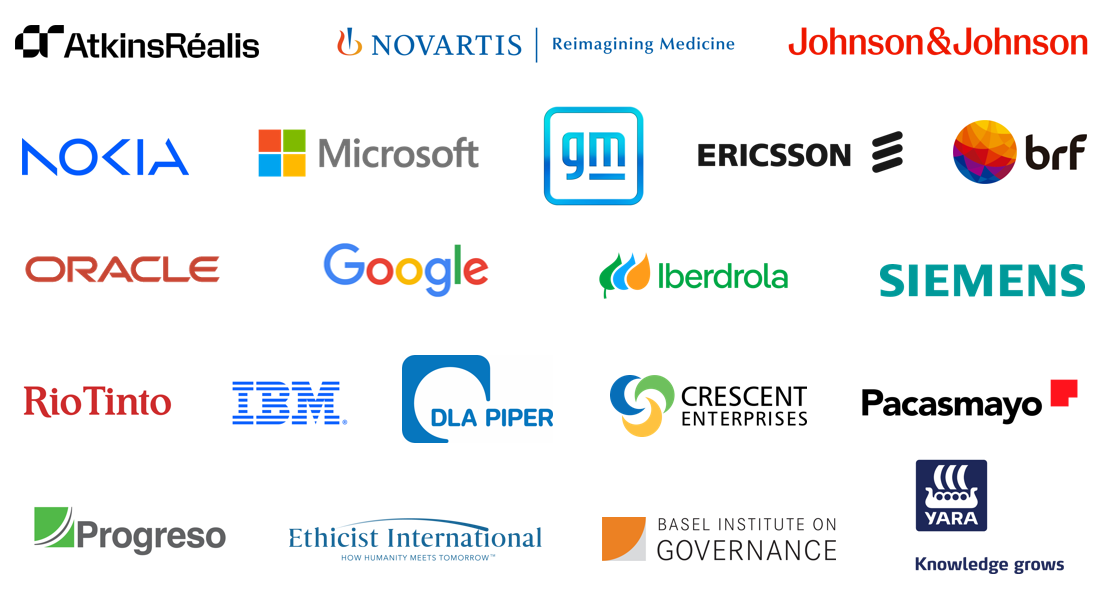Businesses are well-placed to inform policy priorities and to develop novel solutions to corruption and integrity challenges. Engagement between the private and public sectors, however, tends to be limited to ad-hoc interactions, often in a sensitive enforcement context. GPS seeks to unlock the creativity and potential of the private sector by providing a collaborative forum for sustained dialogue and innovation between business and governments.
Galvanizing the Private Sector
The Galvanizing the Private Sector (GPS) programme is a public-private co-operation initiative that seeks to mobilise the private sector as key contributors in the fight against corruption and as promoters of a rules-based international business climate.

About the programme
GPS vision and objectives
1. A Voice for Business: Providing a collaborative platform for business to share their views with government and inform international, national and sectoral anti-corruption and integrity priorities
2. Advocacy: Empowering business to act as advocates for integrity in their supply chains and operating markets
3. Innovation: Identifying and/or developing innovative practices to promote integrity
4. Best Practice Sharing: Disseminating successful business-led approaches within the private sector as well as with governments and civil society
GPS structure
The Anti-Corruption Leaders Hub (ACLH) is GPS’ overarching forum for public-private sector collaboration. The ACLH gathers more than 70 Chief Compliance Officers (or equivalent) from multinational enterprises as well as high-level government representatives and civil society leaders. The ACLH provides a platform for senior compliance executives to engage in dialogue with peers and governments, identify emerging and systemic corruption issues, and develop potential solutions. The ACLH institutionalises engagement between the business community and public sector in a collaborative, non-enforcement related context.
The ACLH informs the priorities of multiple GPS workstreams that are led by OECD subject matter experts. The workstreams convene representatives from GPS member companies and governments to discuss, develop, and publish practical, business-led solutions to shared integrity challenges as well as to participate in innovative peer-to-peer learning initiatives.
Learn about our latest activities and upcoming events in the first edition of GPS Updates.
A selection of GPS members
Get in touch
If you are interested in joining the initiative or would like to learn more about the workstreams, please contact:
Ingrid Hampe, Lead Policy Analyst, ingrid.hampe@oecd.org
Rita Guelzim, Policy Analyst, rita.guelzim@oecd.org
Partners
The Galvanizing the Private Sector (GPS) programme is funded by the U.S. Department of State, Bureau of International Narcotics and Law Enforcement Affairs (DOS/INL), and managed by the OECD, amongst other implementing partners, such as the U.S. Department of Commerce, CoST – the Infrastructure Transparency Initiative (CoST), Center for International Private Enterprise (CIPE), and the United Nations Office on Drugs and Crime (UNODC).

Our activities
Compliance Without Borders (CWB) is a peer-to-peer learning programme that matches compliance experts from multinational companies in the private sector with their counterparts at state-owned enterprises (SOEs) through virtual, short-term, and pro-bono secondments. The programme facilitates the transfer of subject-matter expertise and skills using a practical, “learning by doing” approach.
Tech Connect for Integrity is a vehicle for accelerating the use of technology and data to combat corruption and fraud. To this end, the initiative aims to bring together individuals across sectors to collaborate and share best practices, including data scientists, information and technology (IT) experts and individuals responsible for digital reforms and innovation across sectors. Tech Connect for Integrity has two components that will facilitate connections and collaboration between sectors: Peer-to-Peer (P2P Exchange) and Trusted Dialogues.
The Trusted Dialogue on Getting Influence Right convenes a community of government and business representatives through a series of online and in-person meetings to: (i) discuss key political engagement issues facing relevant sectors and (ii) identify core principles of responsible political engagement. The group is currently developing practical guidance for companies on how to engage responsibly with governments through the draft OECD Principles on Responsible Lobbying and Political Engagement for the Private Sector. This guidance will clarify what policies companies can implement to strengthen transparency and integrity in their lobbying and political engagement activities, and ensure these activities are consistent with their broader commitments and goals on responsible business conduct matters.
Strengthening government capacity to assess and account for corporate anti-corruption compliance measures and programmes focuses on the issue of assessing anti-corruption compliance with the aim to:
- identify considerations that could be taken into account by the public and private sectors when developing approaches for evaluating and accounting for corporate anti-corruption compliance measures.
- map existing case studies and methodologies for assessing anti-corruption compliance programmes employed by OECD and non-OECD countries, MDBs, companies and other relevant entities (i.e. investors, stock exchanges and professional associations).
Due diligence for integrity leverages OECD standards on Responsible Business Conduct (RBC) to tackle corruption risks in global supply chains. Through research and engagement with practitioners and experts, this workstream is developing an infographic on how to use supply chain due diligence for tackling corruption risks in companies’ supply chains, and a mapping of corruption-specific criteria used by major sustainability initiatives.
Through engagement with suppliers, public buyers and public integrity officials, this workstream is defining new and effective ways to address integrity and corruption risks in public procurement supply chains. The workstream builds on OECD standards around risk-based due diligence, public procurement and integrity, and moves beyond a narrow understanding of corruption risks in supply chains, by broadening the focus to public integrity risks, including not only bribery, but also undue influence.
The Infrastructure Anti-Corruption Toolbox (I ACT) is a holistic multi-stakeholder approach to empowering actors across the infrastructure value chain to prevent, detect and report corruption. It aims to assist stakeholders to meet international standards and best practices, such as the Blue Dot Network minimum requirements for anti-corruption.
This initiative developed in cooperation with the UNODC and UNGC brought government experts, including from law enforcement and other government agencies, together with their counterparts from the private sector to: (i) discuss the challenges faced when governments incentivise anti-corruption compliance programmes; and (ii) identify good practices and other solutions that both governments and companies can use to improve corporate compliance efforts.





